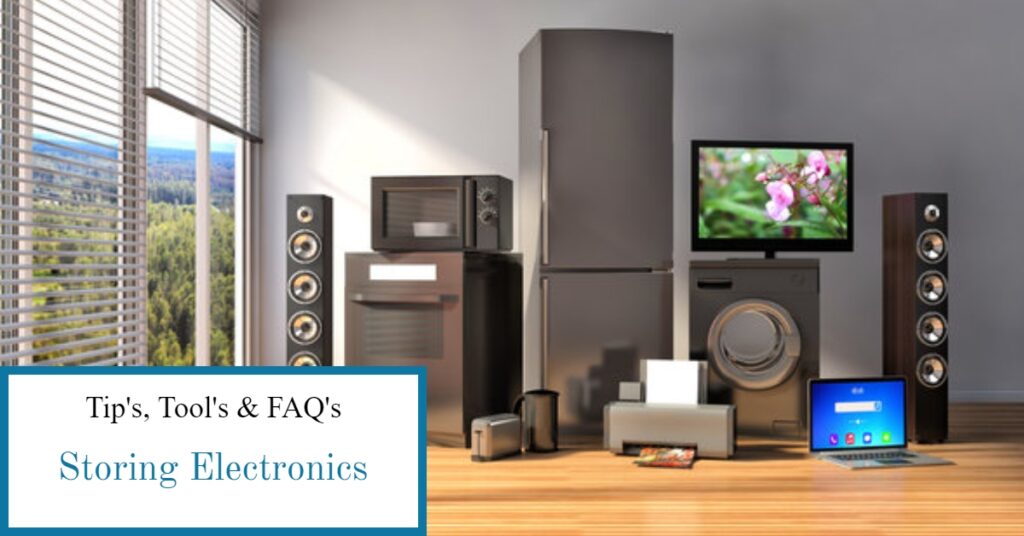
Storing electronics has its own challenges. Electronics covers a broad range of items; each type require their own storage needs. At one time electronics was a small selection of items like televisions, radios, and computers. Today there are electronic components in most of the items we use on a regular basis. Now it includes refrigerators, coffee pots, washers, dryers, air fryers, game systems as well as the traditional items. Therefore, it is best to store electronics according to manufactures recommendations. What if the original paperwork is missing or gone. There is some general guidance that can keep expensive electronics safe during storage.
Prepare For Storage
Firstly, if it has data and can be backed up, do it. Nothing is worse than storing a drive or gaming system and something happens during storage that wipes out the saved games, data, or digital photos. In other words, the best practice before storing electronics is to back them up if possible.
Secondly, before storing electronics they should be cleaned. Use a can of compressed air known as “canned air” and blow the dust and dirt from all electronic components. This may require removing the cover to access cooling fans and circuit boards. If not comfortable removing the cover take to a local technician who can clean it before storage. Next wipe down all screens with an antistatic cleaner. This will prevent dust from sticking to the screen while in storage.
Next, remove all cords, wipe them down to clean. Label and store the cords either in a separate tote or use a Ziplock bag and keep them with the electronic equipment it goes to. Use the method that works best for you.
Lastly, when storing electronics protect them. During transport and moving into the storage area is when the biggest risk of damage can occur. Bubble wrap provides an extra layer of protection. Cover all vents or access points to prevent dust from invading the equipment. If the original packaging is available this would be the best way to protect the electronics during storage. Keeping electronics protected should be the top priority.
Choosing Correct Storage
To store electronic equipment properly a few simple questions will decide the correct storage choice. What is the climate like? What time of year is it being stored? How long will it be stored? These are all important questions to ask before deciding where to store electronics.
Firstly, is it hot and humid where the electronics will be stored. If the answer is yes, only store electronics in climate-controlled storage. Moisture is bad for electronic equipment. It will cause corrosion, rust, short-circuiting when the device is used again. Humidity can cause an array of malfunctioning on electronic parts. Therefore, if storing electronics in humid climates only use climate control storage.
Next, what if the climate is cold or storage will be over freezing winter months? Most electronics are better off stored in cool, dry environments. The only exception to this general rule is if there is a chance of freezing. Do not store where freezing may occur. Liquid Crystal Displays (LCD) have the greatest risk of freezing which causes irreversible damage. LCD are commonly used for flat screen televisions, computer monitors, digital cameras, and camcorders, plus an array of handheld video game systems. Other places LCDs are used is for video projection equipment and electronic billboards. Chances are the screen on the refrigerator, stove, clock, or DVD player are all LCD. Protecting these expensive items when in storage is important. In other words, do not store any LCD devices where there is a chance of freezing.
Lastly, how long will the electronic equipment be in storage? If it will be in storage for a long time only consider climate-controlled storage. The longer it is exposed to big temperature swings, the greater the chance for damage. As mentioned, moisture and dust are the most damaging to electronic equipment in storage. Hence the need for a climate-controlled storage unit. The unit will be regulated so no big temperature fluctuations will happen. In climate-controlled storage if will not have a chance to freeze protecting all the LCD items.
If stored improperly
What to do if electronics are stored improperly. First, allow the equipment to warm up to room temperature over a few days’ time. This will allow all the moisture that will condense on the circuits to evaporate. Next, inspect the equipment for any visible signs of damage before using. Then use canned air to remove any debris and dust from the equipment. Afterwards, clean the unit to prevent mold and mildew from growing in the warmer temperatures. Lastly, plug in and watch for any malfunctions before putting back into use. Monitor for the next several days for any changes in functionality. If it malfunctions unplug and replace before it becomes a fire hazard. In other words, use caution when using electronics that have been stored improperly.
To summarize, storing electronics properly requires a little knowledge about the environment in which it is being stored, plus some simple maintenance to prevent damage. When we know that dust, moisture, and temperature play a vital role in keeping electronics safe, storing properly becomes a necessity. Protect your electronic investment with proper storage.
Recent Comments